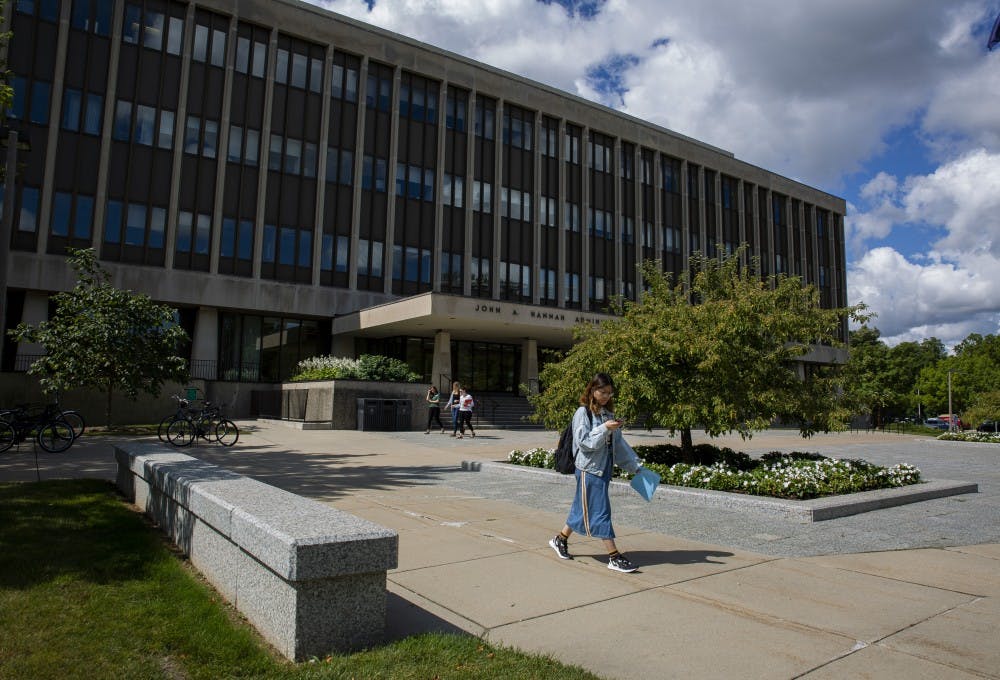Michigan State University is now offering an alternative grading system for the spring semester.
The decision, made Tuesday night, came after some were concerned about students' grades being lower because of online work and stress about COVID-19.

The Hannah Administration Building on Aug. 23, 2019 in East Lansing.
Michigan State University is now offering an alternative grading system for the spring semester.
The decision, made Tuesday night, came after some were concerned about students' grades being lower because of online work and stress about COVID-19.
"One of the very first things that my office did was start asking questions about what the students need in order to be successful through this. ... We still have a large menu of options of different things that might be possible," Associate Provost for Undergraduate Education and Dean of Undergraduate Studies Mark Largent said Thursday. "We're in conversation with other universities who are doing different kinds of things, as well. But this seems to be everybody's sort of first thing that they did."
Students can request to have their grades recorded in a binary grading system of satisfactory/not satisfactory (S/NS). This would replace the typical number grade reported.
Grades reported as S/NS will not be recorded in the students' GPA and will not factor into the calculation of the dean's list.
Students can choose whether or not to use this option for each course they are enrolled in during the spring 2020 semester.
"So, this is an optional grade reporting policy," Largent said. "It doesn't change anything that the professors do. The professors do what they were planning on doing before, which for the most part is assigning a numerical grade between zero and 4.0 for each student for each class."
Faculty will submit grades to the registrar's office on May 5, and the registrar's office will post those grades. As soon as they are posted, students will be able to view their grades online to decide if they want to keep the numerical grade or change it to satisfactory/not satisfactory.
After receiving grades on May 6, students will have a two-week window to decide how they would like their grades reported.
Largent said the satisfactory/not satisfactory grading will not be used in determining secondary admissions to colleges like the Eli Broad College of Business, the College of Engineering, the College of Education or the College of Nursing, and it won't be used for merit-based scholarships.
The threshold for a S/NS grade is 1.0 score.
If a student needs to receive a 2.0 in a course for a requirement within their major, the information and grades will still be available if they choose to report it as S/NS. In other words, the academic unit can still access the numerical grade to determine if they filled a requirement.
Students eligible for this grading system include all undergraduate students coded as an undergraduate (UN), English language (EL), agricultural technology (AT) or lifelong undergraduate (LU). Some graduate students also apply, including those who are coded as a graduate (GR, i.e., doctoral or masters), graduate certificate (GC), lifelong graduate (LG), post-doctoral (PD) and law students taking non-law MSU courses (LD).
Students in the College of Human Medicine, College of Law, College of Osteopathic Medicine and College of Veterinary Medicine are not eligible.
"The other thing — and I can't stress this enough — students need to talk to their academic advisers," Largent said. "In doing all this work, we've also been working very hard to ensure that the advisers have a very good understanding of the consequences of different kinds of decisions students can make."
Students can schedule an appointment with their adviser online and can conduct an appointment via email, telephone or Zoom meeting.
Students can also use MSU's new satisfactory/not satisfactory webpage, which details the policy and has a list of frequently asked questions.
For more coverage of COVID-19 and its effects on the Michigan State community, stay with The State News online, in print and on our Twitter, Instagram and Facebook accounts.
Support student media! Please consider donating to The State News and help fund the future of journalism.